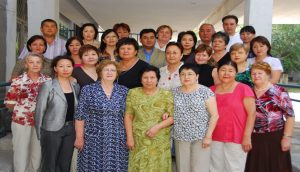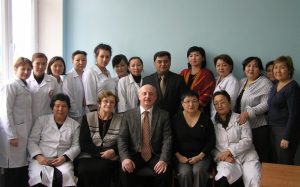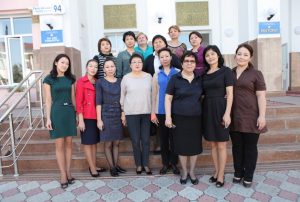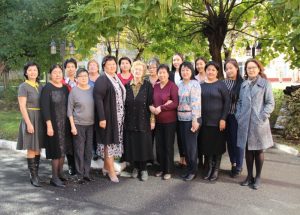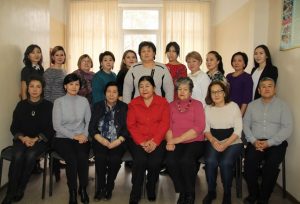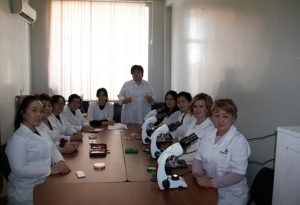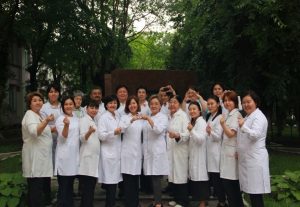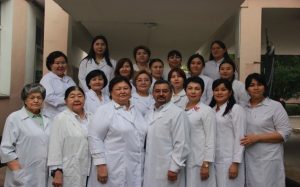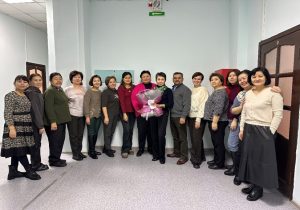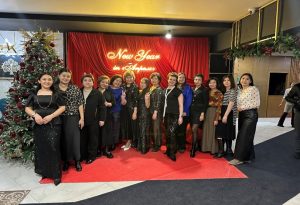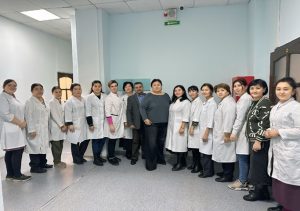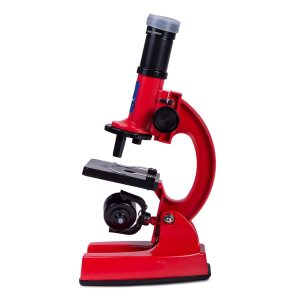
The history of the Department of Microbiology and Virology of S.D. Asfendiyarov Kazakh National Medical University
MICROWORLD ENCHANTED
MICROARMY SURROUNDED
MICROSHAPE CAPTIVATED
MICROACTION ASTOUNDED
A.L.Kotova
The heads of the department over the years:
- 1933–1937-Doctor of Medical Sciences, Professor I.A. Sutin
- 1938–1939-Professor N.A. Bulanov
- 1939–1947-Doctor of Medical Sciences, Professor E.I. Demikhovsky
- 1948–1953-Doctor of Medical Sciences, Professor D.F. Tsimbalist
- 1953–1957-Candidate of Medical Sciences, Associate Professor Yu.S. Linetskaya
- 1957–1963-Doctor of Medical Sciences, Professor E.I. Shtikkel
- 1963–1986-Doctor of Medical Sciences, Professor K.A. Makirov
- 1986–2001-Doctor of Medical Sciences, Professor A.L. Kotova
- 2002 year Candidate of Medical Sciences, Associate Professor Q. Qudaybergenuly
- From 2002 to the present-Doctor of Medical Sciences, Professor B.A. Ramazanova
The Department of Microbiology and Virology was founded in 1932 and was based at the Kazakh Institute of Microbiology and Epidemiology.
The founder and first head of the department was Peter Fedorovich Belikov сandidate of biological sciences, professor. At the time of its establishment, the department consisted of only four staff members, and the education was provided exclusively to students of the medical faculty. In line with the healthcare needs of Kazakhstan at that time, the department staff conducted scientific research in the field of diagnosis, prevention, and treatment of intestinal infections.
From 1933 to 1937, the department was headed by professor I.A.Sutin. During this period, the department also consisted of 4 people, and students from the medical faculty were the only ones being trained. In the following years, from 1938 to 1947, the department was led by N.A.Bulanov and E.I.Demikhovsky. At that time, the department was located on the lower floor of the building at the corner of Furmanov street and Aiteke Bi Street (in the building where the U.S. Embassy is currently located). The staff was small, and there were no candidates of sciences or associate professors among them. Nevertheless, the staff continued to work on issues related to intestinal infections, as well as studying tick-borne encephalitis and purulent coccal infections.
In the following years, the department was headed by professor D.F. Tsimbalist, associate professor Yu.S. Linetskaya, and professor E.I. Shtikkel. During this period, the department was located in the old academic building No. 7 (88 Tole Bi Street). Classes were conducted in paired groups in three large classrooms on the first floor. The department staff became actively involved in training specialists, and graduate students appeared, for whom four rooms were allocated, equipped with the necessary equipment at that time. The department also acquired an electron microscope, which was placed in the largest room, where the head of the department’s office was located as well. The presence of the electron microscope allowed graduate students to conduct research on the structures of bacteria, viruses, and fungi, create atlases, and use them in the educational process. Another significant achievement was the presence of the department’s own vivarium, where experiments could be conducted on rabbits, guinea pigs, white mice, and rats. During these years, education was not only provided to students of the medical faculty but also to those from the pediatric and sanitary-hygienic faculties. The department also saw the emergence of tenured faculty members who were responsible for all methodological work and wrote the first methodological recommendations and manuals for students. These included associate professors Yu.S. Linetskaya, M.Ya.Sidorkina, N.S.Evdokimova, and assistants N.P.Beklimisheva, N.I.Khorsova, A.Polyanskaya, and B.S.Basargin. Since 1957, the department has actively developed its scientific activities. Between 1957 and 1963, 21 dissertations were defended (4 doctoral and 17 candidate theses), one monograph, one textbook, five methodological recommendations, and about 203 scientific articles were published. During these years, the Department of Microbiology continued to play an important role in the development of medical science and the training of qualified specialists, maintaining the traditions of scientific inquiry and educational activities.
In 1963 K.A.Makirov became the head of the department. At that time, the department had only 3 classrooms, which were poorly equipped, and in 1970, the department moved to a new building, the Central Scientific Research Laboratory at 543 Seyfullin Street (now the dental clinic). Here, the department occupied the entire second floor, about 40 rooms, which included both classrooms and those designated for scientific research. The infrastructure significantly expanded, with specialized facilities such as a medium preparation room, an autoclaving room, a washing room, an electron microscopy laboratory, as well as bacteriological, serological, cell culture, and experimental laboratories for the research of graduate and doctoral students. All classrooms were equipped according to a unified standard, with thermostats, special tables, and microscopes, which allowed for a higher quality of education and enabled students to gain practical skills such as working with animals, pure bacterial cultures, cell cultures, performing reactions, staining microorganisms, microscopy, and studying the structure of pathogens. During this period, full-time and evening students from the medical, pediatric, and sanitary-hygienic faculties, as well as full-time and part-time students from the pharmaceutical faculty, were trained. A little later, microbiology began to be taught to students of the dental faculty as well. From 1975 to 1986, under the leadership of K.A. Makirov, more than 25 doctoral and candidate dissertations were prepared in the department. Under his guidance, the department was staffed by Associate Professors Yu.S. Linetskaya, N.S. Evdokimova, M.Ya. Sidorkina, N.P. Beklimisheva, K.Qudaibengenuly and assistants M.G. Sabirova, K.U. Urumbaeva, L.I. Fokhridina, R.N. Presnyakova, Sh.A. Beisembayeva, Sh.M. Nurgalieva, N.I. Baizhanov, Yu.Sh.Kaliev, G.A.Gulayeva, N.T. Taurbaeva, and M.K. Isabaeva.
From 1986 to 2001, under the leadership of doctor of medical sciences, Pprofessor A.L. Kotova, the department employed 13 faculty members, including 2 professors, 6 associate professors, and 2 senior lecturers. During these years, more than 50 candidate and doctoral dissertations were defended under her guidance. The department also introduced training for interns in «Clinical Microbiology». Under the leadership of A.L.Kotova, the following individuals worked at the department: doctors of sciences, professors L.I. Fokhridina, N.S. Evdokimova; candidates of sciences, associate professors K.U. Urumbaeva, K.Qudaibengenuly, N.T. Taurbaeva, M.G. Sabirova, B.A. Ramazanova, S.Sh. Shakiev, A.A. Tabaeva, K.K. Karibayeva, D.Ch. Urazbaeva, Kh.M. Isina; senior lecturers A.A. Stamkulova, Z.S. Kenzhebaeva; assistants, candidates of medical sciences G.M. Zhaktaeva, R.R. Yusupov, candidate of biological sciences Zh.F. Adietova, candidates of medical sciences T.S. Begadilova, A.L. Bisenkenova, M.V. Usmanova, M. Makenova; senior laboratory assistants A.V. Soboleva, L.P. Gershevich, O.A. Durova; laboratory assistants V.A. Vlasova, A. Alibaeva.
Since 2002, the department has been headed by doctor of medical sciences, professor B.A. Ramazanova. During this time, the first medical microbiology textbook for students of all faculties in the Republic of Kazakhstan was published in the Kazakh language, along with the National Guidelines for Laboratory Workers. Extensive scientific work has been carried out within the framework of scientific projects at various levels, including university-level, national (Republic of Kazakhstan), and international projects. The data obtained from these studies enabled the Ministry of Health of the Republic of Kazakhstan to include pneumococcal vaccination in the vaccination schedule, which helped reduce child mortality and prevent the risks of complications from invasive infections.
The department remains one of the leading educational and scientific centers today, based at 543 Seyfullin Street (corner of Tole Bi Street), and is a division of the Kazakh National Medical University named after S.D. Asfendiyarov. It employs highly qualified specialists, whose primary focus is the preparation of educated, competent, and competitive professionals. The department trains students from all faculties and specialties, as well as master’s and doctoral students in the fields of «Medicine» and «Biomedicine». The priorities of the department’s scientific activities include vaccination, parasitology, antibiotic resistance of microorganisms, the study of genetic polymorphism in disease-causing agents, the normal microbiota of the human body, intestinal and nosocomial infections, clinical microbiology, and mycology.
In the last two years, new modern textbooks have been prepared and published, including «Fundamentals of Medical Parasitology» (the first for medical universities), «Fundamentals of General Medical Microbiology» and «Oral Microbiology». Methodological recommendations such as «Fundamentals of Microbiology: Microbiological Aspects of Pharmaceutical Production» and «Fundamentals of Sanitary Microbiology» have also been released. In collaboration with the branch of the «Scientific and Practical Center for Sanitary-Epidemiological Expertise and Monitoring» of the State Enterprise on the Right of Economic Management «National Center for Public Health» of the Ministry of Health of the Republic of Kazakhstan, the department has published republican-level methodological recommendations, including «Laboratory Diagnosis of Meningococcal Infection and Purulent Bacterial Meningitis» and «Bacteriological Methods for the Detection of Typhoid, Paratyphoid, and Other Salmonelloses». Since 2022, the department has begun teaching a new subject, «Medical Parasitology» for students of the faculties of «General Medicine» and «Pediatrics». Starting in 2024, the department will offer postgraduate professional training (FPC) as part of additional education on current topics in education and modern science for faculty members from Kazakhstan and abroad. The department is actively developing an academic mobility program and visiting professor initiatives. Staff members travel to universities in Kazakhstan and abroad to give lectures. Significant work is being done to implement modern teaching methods for students. Leading staff members are engaged in expert work across various fields of activity within relevant structures and commissions.
Under her leadership, the following professors worked: A.L. Kotova, A.A. Tabaeva, L.I. Fokhridina, academic professors K.U. Urumbaeva, K.Qudaibengenuly, associate professors N.T. Taurbaeva, M.G. Sabirova, S.Sh. Shakiev, K.K. Mustafina, D.Ch. Urazbaeva, Kh.M. Isina, Handillayeva B.M., senior lecturers A.A. Stamkulova, and assistant professors with a medical sciences degree G.M. Zhaktaeva, R.R. Yusupov, candidate of biological sciences Zh.F. Adietova, candidates of medical sciences T.S. Begadilova, A.L. Bisenkenova, M.V. Usmanova, M. Makenova, L.K. Tastanbekova, I.M. Kasymbekova, A.M. Barmakova, F.R. Amzeeva, Handillayeva Z.M., senior laboratory assistants A.V. Soboleva, L.P. Gershevich, O.A. Durova, and laboratory assistants V.A. Vlasova.
Currently, the department employs a team of highly qualified educators: Professor K.K. Mustafina, associate professors and assistant professors R.R. Yusupov, T.S. Begadilova, A.L. Bisenkenova, E.A. Koloskova, N.T. Taurbaeva, G.D. Akhmetova, A.I. Igisenova, and assistant professors Z.M. Handilla, G.N. Bisegulova, U.B. Iskakova, B. Rysalova, senior lecturers and assistant professors Sh.E.Ugishova, A.A. Musaeva, G.S. Nurgazina, G.H. Askar, J.O. Mustapaeva, and D.V. Bunayeva. Master’s and doctoral students are also enrolled.
Over the course of the department’s existence, approximately 80 dissertations have been defended, more than 20 monographs published, 10 textbooks, and over 50 educational and methodological guides in Kazakh and Russian, 8 collections of test assignments, more than 50 patents for inventions, and 20 certificates for rationalization proposals. Additionally, in recent years, the department’s faculty has published numerous articles, including those indexed in the Scopus database.
According to the archives of the KazNMU Museum named after S.D. Asfendiyarov, the Department of Microbiology consistently ranked first in its indicators from the very first year of its existence, as evidenced by the corresponding document. Throughout the years and to this day, the Department of Microbiology and Virology has remained one of the top departments of the university according to its ranking.
In 2024-2025, the Department of Microbiology and Virology at KazNMU named after S.D. Asfendiyarov underwent a major modernization. The department was completely renovated, and two modern laboratories were created (microbiological and parasitological), equipped with state-of-the-art air conditioning systems and equipment (sequencer, biotyper, antibiotic sensitivity analyzer, and hemocultivator), enabling students to acquire and refine practical skills as well as conduct high-level scientific research. All classrooms were equipped with modern ergonomic furniture, interactive whiteboards, and microscopes manufactured by Carl Zeiss and Olympus.
| Biographies of the heads of the department and their contribution to the development of education and science of RK | |

Pyotr Fedorovich Belikov (1892-1961) сandidate of biological sciences, professor
|
Pyotr Fedorovich Belikov (1892-1961) сandidate of biological sciences, professor
Early Years and Education: He was born on June 23, 1892, in Moscow. During World War I (1914–1916), he served in the army. After completing his medical education, he began working at the G.N. Gabrichevsky Institute, where he took the position of assistant at the Department of Microbiology, based at the dissection hall of the Novo-Ekaterininskaya Hospital. At the same time, until 1923, he held the position of sanitary doctor at the Moscow City Administration, overseeing the Sushchevsky, Mariinsky, and Krestovsky districts. In 1923, he was invited to work at the chemical-bacteriological laboratory of the State Institute of Sanitary Organization. Scientific Activity: In 1925, P.F. Belikov organized the chemical-bacteriological office at State Institute of Sanitary Organisation, which he led until 1930. The main areas of scientific research at the office included microbiology, biochemistry, and immunology of pathological processes in the oral cavity, particularly dental caries and periodontosis. Belikov became an ally of A.I. Evdokimov, participating in the formation and development of Soviet dentistry. Repression and Work in Kazakhstan: In 1930, Belikov was arrested as part of the so-called “doctors’ microbiologists’ case” (https://pravo.ru/process/view/26353/) and exiled to Kazakhstan in 1931. There, along with other repressed scientists, he founded the Department of Microbiology at the Kazakh Medical Institute and organized the production of smallpox vaccine and diphtheria anatoxin. Return and Further Career: After returning from exile in 1934, he organized the Clinical Microbiology Laboratory at the M.F. Vladimirskiy Moscow Regional Research and Clinical Institute (MRRCI). In 1935, a medical and dental university was established at the State Institute of Sanitary Organization, where Belikov was appointed as a professor and awarded the degree of Candidate of Biological Sciences. In 1943, he became the head of the Department of Microbiology at the Moscow State Dental Institute (MSDI), and from 1947 to 1954, he served as the institute’s vice-director for academic and research affairs. Simultaneously, he held the position of deputy director for research at the I.I. Mechnikov Institute of Vaccines and Sera. His research during this period covered microbiology, biochemistry, and immunology of infectious diseases (diphtheria, measles, scarlet fever, mumps, pneumonia, influenza, poliomyelitis) and pathological processes in the oral cavity. Public and Scientific Publishing Activities: Belikov was an active participant in the publication of the journal “Odontology and Dentistry” and a member of the Scientific Council of the Ministry of Health and the Board of the Society of Microbiologists. Scientific Legacy and Awards:He was the author of more than 60 scientific works, including one monograph, most of which were dedicated to the microbiology of the oral cavity. For his contributions, he was awarded various orders and medals of the Union of the Soviet Socialist Republics. Death: P.F.Belikov passed away in 1961 and was buried at the Vvedenskoye Cemetery. |
|
Sutin Ilya Aronovich doctor of medical sciences, Professor (1897-1979)
|
Sutin Ilya Aronovich Doctor of Medical Sciences, Professor
Early Years and Education He was born on September 19, 1897, in the city of Minsk into a middle-class family of Jewish descent. He graduated from a real school and then enrolled in the medical faculty of Moscow State University. Career in Belarus From 1922 to 1931, he worked as an assistant professor in the Department of Microbiology at the Medical Faculty of Belarusian University. Repression and Work in Kazakhstan In March 1932, he was convicted by the United State Political Office Collegium for his alleged involvement in a counter-revolutionary organization and was exiled from Belarus to Kazakhstan for three years. On April 15, 1932, he began working as an assistant professor in the Department of Microbiology at the Kazakh State Medical Institute in Alma-Ata, and in August of the same year, he was appointed its head. In 1934, he was awarded the title of associate professor, and in 1935, he defended his doctoral dissertation on the topic “On the Biology of Museum Paratyphoid Strains of the Union of the Soviet Socialist Republics”. In 1936, he was granted the title of professor. At the same time, he held the position of head of the department and deputy director of the Regional Sanitary-Bacteriological Institute (1932–1936), as well as heading the Department of Microbiology at the Kazakh Veterinary Institute (1933–1936). Work at the Stalingrad Medical Institute In 1937, Sutin was transferred to the Stalingrad Medical Institute (now Volgograd State Medical University), where he headed the Department of Microbiology from 1937 to 1942 and again from 1945 to 1952, after which he continued working as a professor. Activity During World War II During the war, the Crimean Medical Institute was evacuated to Kyzylorda. Sutin headed the Department of Microbiology at this institute and worked there from 1942 to 1944, organizing the educational process under the challenging conditions of evacuation. Scientific and Pedagogical Activity Sutin made a significant contribution to the development of microbiology. He actively studied bacteriophagy, published a monograph titled «Bacteriophage and Its Application in Medicine», and supervised the completion of several candidate dissertations. In 1951, under his guidance, a practical manual titled «Medical Microbiology» was created, which went through six editions and was translated into six languages. Awards and Public Activity For his scientific and pedagogical work, Sutin was awarded the «Order of the Badge of Honor», the «Excellence in Healthcare» badge, an honorary diploma from the Stalingrad Regional Executive Committee, and was recognized with orders from the People’s Commissariat of Health of the Russian Soviet Federative Socialist Republic on significant anniversaries. Rehabilitation Sutin was rehabilitated on July 27, 1956, by the Judicial Board of the Supreme Court of the Belarusian Soviet Socialist Republic Death Ilya Aronovich Sutin passed away in 1979 in Volgograd. Major Achievements
|
|
|
Pyotr Aleksandrovich Bulanov Doctor of Biological Sciences, Professor (1942), Corresponding Member of the Academy of Sciences of the Kazakh Soviet Socialist Republic (1954) Biography He was born in the early 20th century. In 1930, he graduated from the Vitebsk Veterinary Institute. From 1934, he worked at the Alma-Ata Zooveterinary Institute, where he began his scientific career. In 1961, he moved to the Institute of Biology of the Academy of Sciences of the BSSR, and in 1964, he became the head of the Department of Microbiology at Belarusian State University. In 1969, he continued his work at Kazakh University, and from 1973, he served as a scientific consultant at the Institute of Genetics and Cytology of the Academy of Sciences of the Belorussian Soviet Socialist Republic. Scientific ActivityBulanov’s scientific research covered a wide range of topics:
Awards and recognition For his contribution to science and practical medicine, he was awarded the Order of the «Badge of Honor». Significance of his work The works of Pyotr Alexandrovich Bulanov made a significant contribution to microbiology, veterinary science, toxicology, and oncology. His research had both theoretical and practical value, especially in the fight against infectious diseases and the development of innovative treatment methods. |
|
|
Yefim Ilyich Demikhovsky (pen name Gordey Nemilov) Doctor of Biological Sciences, Professor, Poet (May 10, 1901 – July 15, 1995) Biography Yefim Ilyich Demikhovsky was born on May 10, 1901, in the village of Shchedrino, Bobruisk district, Minsk province (now located in Belarus). He studied at the Vilna Gymnasium, which was evacuated to Yekaterinoslav (now Dnipro, Ukraine) in 1915. This city became center of his life. In his youth, he actively participated in public life. He worked as a correspondent for the newspaper «Krasny Boyets», covering events on the Southern Front. In the 1920s, he served as the responsible secretary of the newspaper «Gryadushchaya Smena» and its literary supplement «Molodaya Kuznitsa». He was a participant in the 1st All-Russian Congress of Writers and Poets, where he represented the younger generation of writers, performing under the pen name Gordey Nemilov.Education and Career He graduated from Yekaterinoslav Medical Institute in 1924 and completed administrative-sanitary courses in Kharkiv in 1925. His professional career began at that time:
Scientific Activity Yefim Demikhovsky made a significant contribution to the development of microbiology. His scientific interests included the study of:
He authored over 120 scientific papers and served as the responsible editor of the interdepartmental collection “Antibiotics” (1965–1970). He was a member of the board of the All-Union Society of Microbiologists, Epidemiologists, and Infectious Disease Specialists (1939–1956). Department and Achievements Under Demikhovsky’s leadership, the Department of Microbiology actively developed. During his tenure at the Department of Almaty Medical Institute, the department was based on the lower floor of the building that now houses the U.S. Embassy in Almaty (Furmanov and Aiteke-Bi streets). Despite a limited staff, the team continued research in the field of infectious diseases. Literary Activity Alongside his scientific work, Demikhovsky wrote poetry, publishing under the pen name Gordey Nemilov. Legacy Yefim Ilyich Demikhovsky left a significant mark in the history of microbiology and literature. His scientific legacy and contribution to the organization of the educational process made him an outstanding figure in domestic science of the 20th century. |
|
|
Dmitry Fedorovich Tsymbalist Doctor of Medical Sciences, Professor (1894-1961)
Biography Dmitry Fedorovich Tsymbalist was born in 1894 in the village of Veliko-Arkhangelskoye, Bobrovsky District, Voronezh Province. He was Russian and became a member of the All-Union Communist Party (Bolsheviks) in 1925. His professional career began after graduating from the feldsher school in 1913. Before entering Voronezh Medical Institute, he worked in the following roles:
In 1931, he graduated from the Voronezh Medical Institute and then completed postgraduate studies at the Department of Microbiology (1931–1933). Professional Career
Scientific Activity Dmitry Fyodorovich is the author of more than 50 scientific works dedicated to relevant issues in microbiology and epidemiology. His research made a significant contribution to the development of these sciences. Recognition and Awards
Awarded with the following orders:
Significance Dmitry Fyodorovich Tsymbalist made a significant contribution to the development of Soviet microbiology and epidemiology, as well as to the training of new generations of doctors. His work was highly valued both in the Russian Soviet Federative Socialist Republic of Russia and the Kazakh Soviet Socialist Republics, where he left a lasting impact on the history of medicine. |
|
The Department of Microbiology staff with the head of the department, Doctor of Medical Sciences, Professor Dmitry Fedorovich Tsymbalist, in the center (1960) |
|
|
Linetskaya Julia Samoilovna (January 7, 1914 – 1957) Candidate of medical sciences, associate professor
|
Linetskaya Julia Samoilovna
She was born on December 25, 1913 (according to the Julian calendar), i.e., January 7, 1914, in the city of Yevpatoria (Crimea) into a family of doctors. In 1931, she graduated from a nine-year school in Rostov-on-Don. In the same year, she entered the sanitary-hygienic faculty of the North Caucasus Medical Institute, later transferring to the Rostov State Medical Institute (RSMI), from which she graduated in 1935 with a qualification as a «Doctor-epidemiologist». From February 1936 to 1939, she studied in the postgraduate program at the Department of Microbiology at RSMI. After completing her studies, she was sent to Kazan, where she worked as an assistant at the Department of Microbiology at the Institute for Advanced Medical Training. In November 1941, due to family circumstances, she moved to Alma-Ata. From January 1942 to October of the same year, she held the position of senior laboratory assistant at the Department of Microbiology, and from October 1942 to 1952, she worked as an assistant at the same department. In 1945, she joined the All-Union Communist Party (Bolsheviks). From 1952 to 1953, she served as the Acting Associate Professor at the Department of Microbiology at the Kazakh State Medical Institute (KazSMI). From 1953 to 1957, she held the position of Acting Head of the Department of Microbiology at KazSMI, after which she continued working as an associate professor at the same department. At the same time, she worked as a junior research fellow in the virology laboratory of the psychoneurological sector of the Academy of Sciences of the Kazakh Soviet Socialist Republics. In 1949, she successfully graduated from the Evening University of Marxism-Leninism. On November 17, 1949, she defended her candidate dissertation on the topic: “Strains of the Seasonal (Spring-Summer) Encephalitis Virus in the Alma-Ata Region.” This research became the first in Kazakhstan dedicated to the regional epidemiology of spring-summer encephalitis. In 1956, the Higher Attestation Commission of the Union of Soviet Socialist Republics awarded her the academic title of Associate Professor. Yulia Samoilovna was fluent in three foreign languages: English, German, and French. She was awarded the “For Diligent Labor during the Great Patriotic War” medal and the “Excellent Health Worker” badge. On November 17, 1949, she defended her candidate dissertation on the topic: “Strains of the Seasonal (Spring-Summer) Encephalitis Virus in the Alma-Ata Region.” This research became the first in Kazakhstan dedicated to the regional epidemiology of spring-summer encephalitis. In 1956, the Higher Attestation Commission of the Union of Soviet Socialist Republics awarded her the academic title of Associate Professor. Yulia Samoilovna was fluent in three foreign languages: English, German, and French. She was awarded the “For Diligent Labor during the Great Patriotic War” medal and the “Excellent Health Worker” badge. |
|
|
Shtikkel Emil Ivanovich
(1904 – 1963) Doctor of Medical Sciences, Professor Born in 1904, of German descent. Education and Early Career: In 1922, he graduated from the Anapa nine-year school. In the same year, he entered the Kuban State Medical Institute, which he successfully completed in 1929. Professional Career:
Scientific Activity and Postgraduate Studies: – 16.12.1933 – 01.03.1937: Postgraduate student at the Central Institute of Epidemiology and Microbiology, People’s Commissariat of Health of the Union of Soviet Socialist Republics (Moscow). Business Trips and Organization of Branches: – 17.02.1940 – 12.12.1940: Work at the Far Eastern Institute of Epidemiology and Microbiology (Khabarovsk) on assignment from the People’s Commissariat of Health of the Union of Soviet Socialist Republics. Medical Practice and Research Work: – 01.01.1942 – 01.09.1947: Head of the district outpatient clinic of the Kopal district (Kopal village, Taldykorgan region, Kazakh Soviet Socialist Republics). Scientific Achievements: – 04.06.1957: Defended his doctoral dissertation on the topic «Experimental Streptococcal Infection, Intoxication and Reactivity of the Organism, as well as Studies on the Treatment of Bone-Joint Tuberculosis with Streptomycin» Publications and Language Skills: – Published 37 scientific papers. Contribution to Medicine: Under the leadership of Emil Ivanovich, important dissertation research was successfully carried out, significant work on the specialization of doctors and medical personnel was completed, and laboratory assistance in dermatovenerological institutions of Kazakhstan was organized. |
|
|
|
|
Kuanish Amanbaevich Makirov Doctor of Medical Sciences, Professor, Colonel of the Medical Service, Veteran of the Great Patriotic War, Participant in the Preparation of the Tehran Conference (1910–1986)
|
Kuanish Amanbaevich Makirov Doctor of Medical Sciences, Professor, Colonel of the Medical Service, Veteran of the Great Patriotic War, Participant in the Preparation of the Tehran Conference (1910–1986) Biography Kuanish Amanbaevich Makirov was born on June 15, 1910, in Aul No. 1, Khobdinsky District, Aktobe Region, into a peasant family of poor farmers. He began his working life at the age of 13 as an assistant herder. After graduating from school in 1930, he enrolled at the 1st Moscow Medical Institute with a recommendation from the Kyzylorda Regional Committee of the Komsomol. Continuing his education at the S.M. Kirov Military Medical Academy in Leningrad, which he graduated from in 1935, Makirov began his service in the Red Army. He rose from military doctor to the head of the medical service of a regiment. He became the first doctor of the Kazakh cavalry regiment. Military Service and Contribution to the Great Patriotic War During the Great Patriotic War, K.A. Makirov held responsible positions in the General Staff of the Soviet Armed Forces. His duties included medical and sanitary support for the Soviet troops, analyzing epidemiological risks, collecting information about enemy military groupings, and combating infectious diseases among both military personnel and civilians. K.A. Makirov participated in the preparation of the Tehran Conference in 1943, where he ensured sanitary and epidemiological safety. During the battles near Warsaw in 1944, he sustained a severe injury. For his achievements, he was awarded:
Scientific and Pedagogical Activities He dedicated many years to teaching in medical higher education institutions. After his demobilization in 1959, Makirov devoted himself to scientific and teaching work. He taught at the 2nd Moscow Medical Institute, holding the positions of senior lecturer and deputy dean. In 1960, K.A. Makirov began working at Kazakh State Medical Institute. From 1963 to 1986, he headed the Department of Microbiology at Almaty State Medical University, was elected secretary of the party committee at Almaty State Medical University, and served as the vice-rector for scientific work at the institute. Kuanish Amanbaevich was not a desk-bound scholar. As part of various commissions of the Ministry of Health of the Kazakh Kazakh State Medical Institute, he repeatedly traveled to different epidemic hotspots, where he demonstrated his ability to organize anti-epidemic measures to protect the population. Based on the results of his research, K.A. Makirov made valuable suggestions to the Ministry of Health of the Kazakh Kazakh State Medical Institute, leading to decisions by the Republic’s government aimed at improving healthcare in the country. He delivered captivating and informative lectures in districts and regions of our republic. In 1967, he visited remote areas of Almaty, Aktobe, Semipalatinsk, and Karaganda regions. K.A. Makirov actively participated in the elimination of epidemic outbreaks, demonstrating outstanding organizational skills. Scientific Contribution |
|
|
|
|
|
Kotova Albina Leonovna Doctor of Medical Sciences, Professor, founder of the Kazakh school of microbiology (July 28, 1932-May 8, 2019)Biography and Contribution Albina Leonovna Kotova is an outstanding scientist, educator, organizer, and mentor, and the founder of the modern school of microbiology in Kazakhstan. She was born on July 28, 1932. Throughout her life, she dedicated herself to the development of microbiology, medical-biological research, and the educational system in the Republic of Kazakhstan.Professional Activities Albina Leonovna organized microbiology departments at universities in Semey, Astana, as well as at medical faculties in Kentau and Kyzylorda. Thanks to her efforts, model programs and state standards for microbiology were developed and implemented across all medical universities in the country. She initiated the introduction of courses in «Clinical Microbiology» and «Medical Parasitology» to educate students and improve the qualifications of faculty members. For more than 20 years, she headed the microbiological laboratory at the Central Research Institute of the Almaty State Medical University (now KazNMU named after S.D. Asfendiyarov). During this time, the laboratory facilitated the preparation of 112 dissertations, including doctoral and candidate theses. Scientific and Educational Activities Albina Leonovna has trained 58 highly qualified specialists: 10 doctors and 48 candidates of medical sciences. She founded the «School of Young Microbiologists» and initiated the first annual student conference on HIV/AIDS in Kazakhstan. In 2002, she proposed and organized the conference «Biosafety and the Fight Against Bioterrorism» A.L.Kotova led numerous research projects at the national and international levels, studying pathogens of infectious diseases, including in environmentally disadvantaged areas. Achievements and Awards
Legacy Albina Leonovna left a lasting mark on the history of science and medicine in Kazakhstan. Her students and followers continue to develop her ideas, making significant contributions to epidemiology, the prevention, and diagnosis of infectious diseases. Her name is forever linked to the development of microbiology in the country and the nurturing of new generations of scientists and medical professionals. |
|
|
|
|
|
Ramazanova Bakhyt Amanullovna Doctor of Medical Sciences, Professor of Medicine Date of birth: December 28, 1958 Position: Head of the Department of Microbiology, Virology, and Immunology Education: 1982 – Graduated from the Faculty of Medicine, Almaty State Medical Institute. 1982–1983 – Internship in Therapy. Professional Experience: 1983–1987 – Doctor at the Emergency Medical Hospital. 1987–1990 – Senior Laboratory Assistant, Junior Researcher at the Department of Microbiology, Scientific Research Institute of Epidemiology, Microbiology, and Hygiene. 1990–1991 – Assistant at the Department of Microbiology, Almaty State Medical University. 1991 – Defense of Candidate’s Dissertation: «Properties of Enterotoxigenic Staphylococci and Their Prevalence» Since 1991 – Work at KazNMU: Assistant, Associate Professor at the Department of Microbiology (since 1997). 1997 – Awarded the title of Associate Professor. 1999–2002 – Full-time Doctoral Studies. 2002 – Defense of Doctoral Dissertation: «Condition of Microflora and Nonspecific Resistance of the Female Reproductive Tract in Contraceptive Users and Possibilities of Correcting the Disorders» 2013–2017 – Vice-Rector for Scientific Work and Innovative Projects, KazNMU. Since 2002 – Head of the Department of Microbiology, Virology, and Immunology.Expert Activities – Chair of the Dissertation Council at KazNMU (2014–2017). – Deputy Chair of the Specialized Council for Doctoral Dissertation Defense (2002–2010). – Chair of the Local Ethics Committee at KazNMU (2013–2017). – Deputy Editor-in-Chief of the journal “Vestnik KazNMU” (2013–2017). – Member of the Editorial Boards of the journals «Laboratory Work», «Phthisiopulmonology» and «Pharmacy of Kazakhstan» Scientific Achievements – Author of more than 250 publications, including: Supervisor: Participation in Scientific Projects Supervisor of the following projects: Awards and Honors – Order of «Qurmet» (2016). Medals: – «For Contribution to the Development of Healthcare of the Republic of Kazakhstan» (2015). Additional Information Full Member of: – European Society of Clinical Microbiology and Infectious Diseases (ESCMID). Main Research Areas – Study of the human microbiome. |
|
|
|
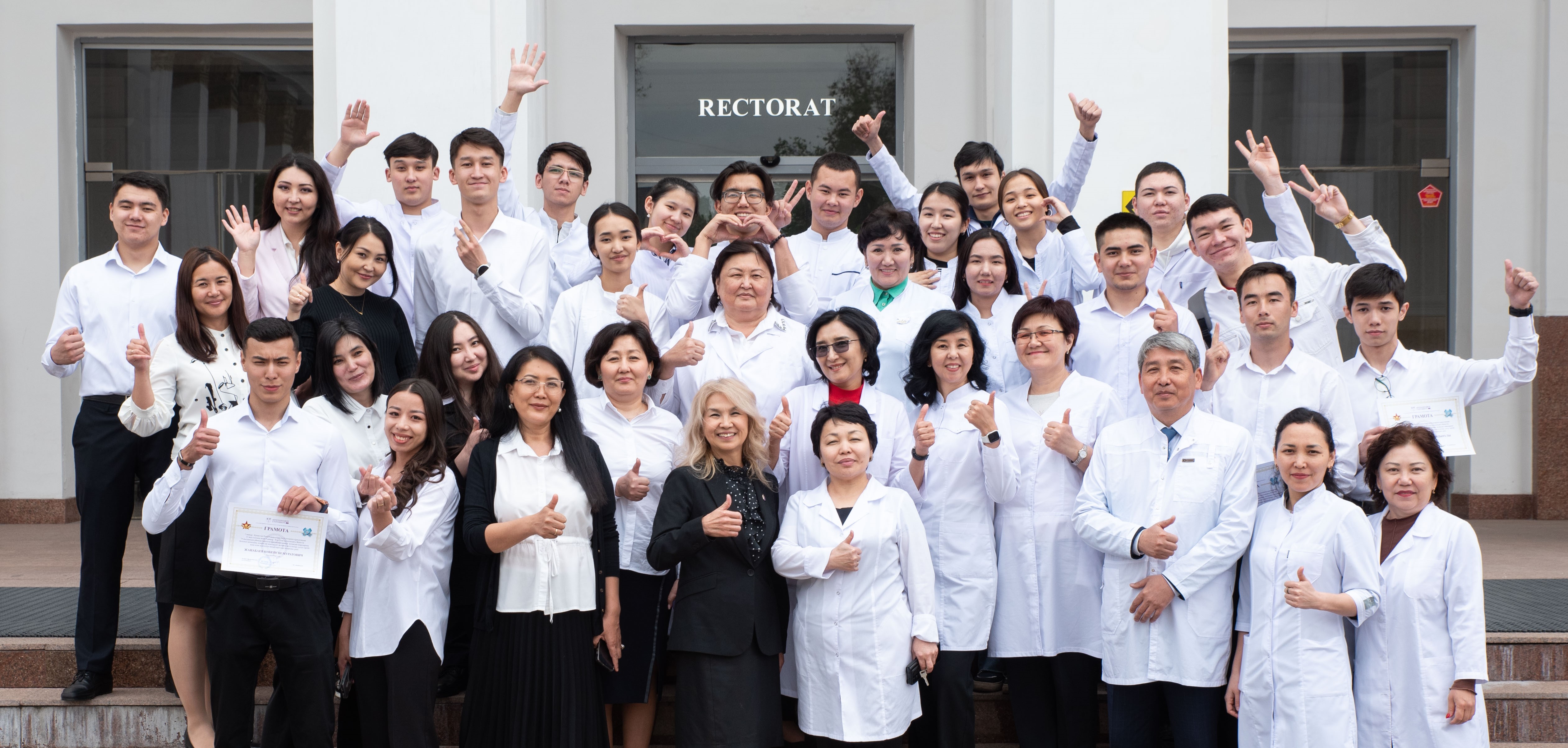








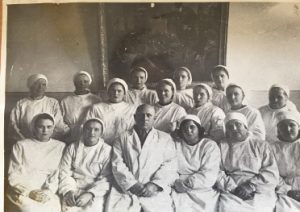


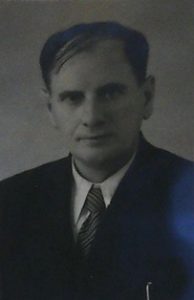
 Shtikkel Emil Ivanovich
Shtikkel Emil Ivanovich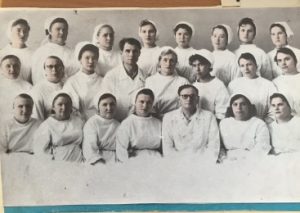


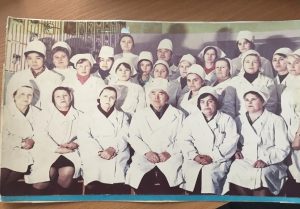
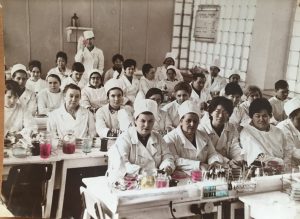
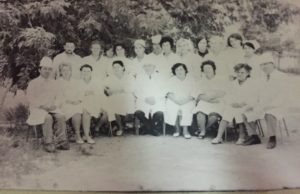
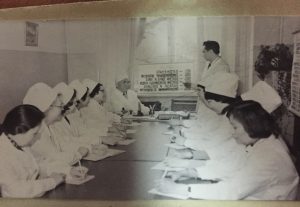
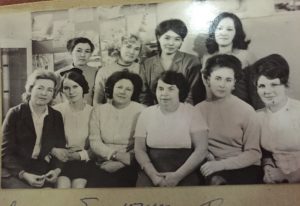
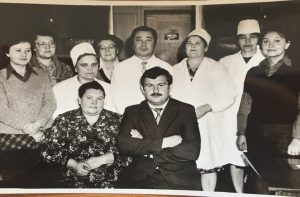

 Kotova Albina Leonovna
Kotova Albina Leonovna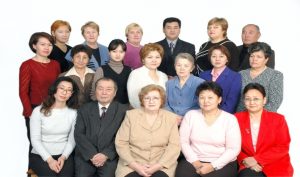

 Ramazanova Bakhyt Amanullovna Doctor of Medical Sciences, Professor of Medicine
Ramazanova Bakhyt Amanullovna Doctor of Medical Sciences, Professor of Medicine
